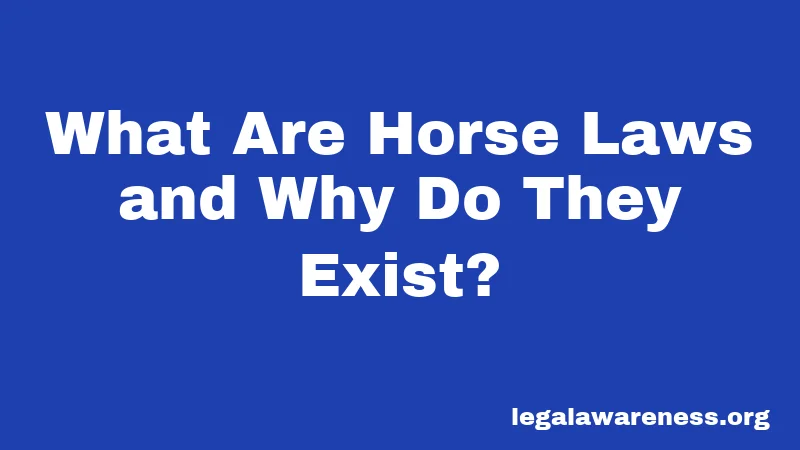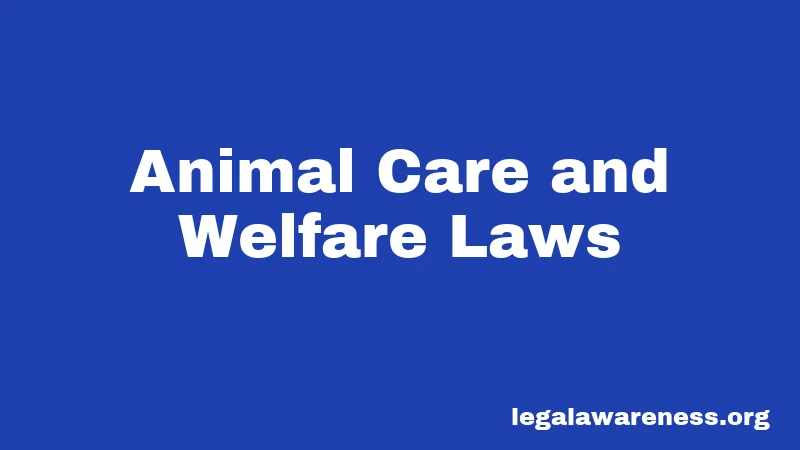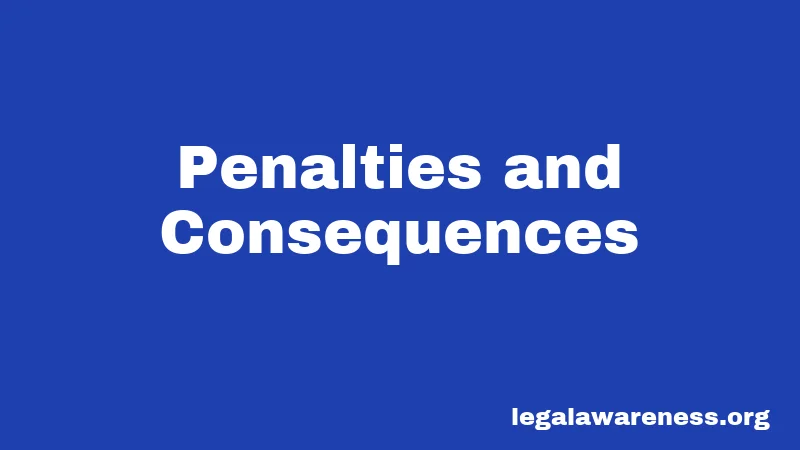Horse Laws in Illinois (2026): What Every Owner Must Know
Most people who own or care for horses have no idea how many rules govern what they can and can’t do. Seriously. But in Illinois, horse laws are strict. The penalties can hit hard if you break them. Let’s break down exactly what you need to know so you can keep your horses safe and stay on the right side of the law.
Whether you’re a longtime horse owner or thinking about getting one, understanding Illinois horse laws is important. You need to know what’s required for basic care. You need to know about liability. And you definitely need to know the consequences of breaking these rules.
What Are Horse Laws and Why Do They Exist?

Simple question with a simple answer: horse laws exist to protect horses and protect people. These laws make sure horses get proper care. They make sure owners are responsible when horses cause accidents or damage. They regulate horse racing and breeding. Think of horse laws as a framework that keeps everything fair and safe for everyone involved.
Illinois has several different types of horse laws. Some protect the horses themselves. Others protect people who ride horses or work around them. Some regulate the horse racing industry. There are also zoning rules about where you can keep horses on your property. Pretty straightforward, right?
Basic Horse Ownership Requirements
Where You Can Keep Your Horse
Here’s where it gets location-specific. Illinois doesn’t have a statewide minimum acreage requirement. But wait—individual cities and counties do. Many municipalities require at least 5 acres to legally keep a horse. You’ll need to check your local zoning ordinances.
Most places also require horses to be kept in fenced areas. The fence needs to be “good and sufficient.” That basically means it needs to actually contain your horse. A broken-down fence won’t cut it.
Not sure what counts as sufficient? Contact your local zoning office or animal control. They can tell you exactly what your area requires. You could face violations if your setup doesn’t meet local standards.
Keeping Horses From Running at Large
This is the big one. Here’s what you absolutely cannot do: you cannot let your horses run loose or escape your property. Period. Illinois law is crystal clear about this.
The Domestic Animals Running at Large Act says owners must take reasonable steps to keep their animals confined. If your horse gets loose and damages someone’s property? You’re liable. If your horse injures someone? You could be held responsible. Even if you didn’t know the horse escaped, you can still face liability depending on the situation.
Okay, pause. Read this carefully. The law does have one exception. If you can prove you used reasonable care to confine your animal AND you didn’t know it was loose, you might have a defense. But honestly, that’s a hard thing to prove. The smarter move? Make sure your fencing is solid and regularly maintained.
Animal Care and Welfare Laws

Proper Care Requirements
Illinois takes animal welfare seriously. The Humane Care for Animals Act spells out what horses need. You must provide:
Food that’s adequate and nutritious. Water that’s clean and fresh. Shelter from extreme weather and temperatures. Veterinary care when your horse is sick or injured. Humane treatment at all times.
That’s not negotiable. Your horse can’t be starved, overworked, beaten, or tormented. These aren’t suggestions—they’re legal requirements. Violating these rules is a crime.
What Counts as Abuse or Neglect
You’re probably wondering what actually crosses the line into abuse or neglect. Here are some examples that will get law enforcement involved:
Beating or kicking your horse. Deliberately causing pain or injury. Starving your horse or providing inadequate food. Leaving your horse without water for extended periods. Failing to provide shelter from dangerous weather. Not treating injuries or illnesses. Abandoning a horse.
One thing surprises many people: overworking a horse without proper rest, food, or water is also illegal. This applies to trail horses, work horses, and racing horses. Everyone has limits.
Not sure if what you’re doing is okay? Think about this: would a reasonable person think your horse is getting proper care? If you’re hesitating, you probably need to change something.
Horse Liability and Legal Responsibility
The Equine Activity Liability Act
Illinois has a special law just for equine activities. It’s called the Equine Activity Liability Act, and it’s really important to understand. Here’s the main point: if you participate in equine activities (riding, training, lessons, etc.), you assume the risk of injury.
That means if you get hurt while riding, you generally can’t sue the stable owner or instructor for the accident—even if it seems like their fault. You accepted the risk when you participated. But wait, it gets more specific.
This law protects stables and instructors UNLESS they were obviously at fault. For example: if the instructor gave you a horse they knew was dangerous and didn’t tell you, that’s their problem. If equipment was broken and they knew it, that’s on them. If there were dangerous conditions on the property they didn’t warn you about, they could be liable.
Every equine professional must post warning signs. These signs must be clearly visible. The letters have to be at least one inch tall. The warning explains that riders assume the risk of equine activities. Professional instructors must also include this warning in written contracts.
Fence Law Liability
Remember that Fence Act we mentioned earlier? It has serious liability implications. If your horse breaks through a “good and sufficient” fence and damages someone’s property, you’re liable. You owe them money for the damage.
That doesn’t seem fair until you think about it. Basically, if someone has a good fence and your horse breaks through it and causes damage, that’s your responsibility. The fence was solid. Your horse got through anyway. That’s on you, the owner.
This is why maintaining excellent fencing isn’t just smart—it’s legally required. A broken fence isn’t just a liability. It’s also a violation of running-at-large laws.
Penalties and Consequences

Criminal Penalties for Abuse and Neglect
Let’s talk about what happens if you break Illinois animal welfare laws. The penalties are serious, and they’ve gotten stricter over the years.
First offense for animal cruelty (beating, tormenting, starving, overworking)? That’s a misdemeanor. You could face fines up to $2,500 and jail time up to six months. It sounds harsh, but Illinois courts don’t mess around with animal cruelty.
But there’s more. If you’re convicted, you might have to undergo psychological evaluation. You might have to pay for treatment. You might be banned from owning animals in the future. That ban can be permanent.
Aggravated cruelty is worse. Aggravated cruelty means you intentionally caused serious injury or death. That’s a Class 4 felony on the first offense. A Class 3 felony on the second. You’re looking at years in prison, not months.
Animal torture (deliberate, prolonged cruelty) is even more serious. Federal felony charges. Major prison time. Thousands in fines. Your life gets very complicated very quickly.
Running at Large Violations
If your horse gets loose and you’re found liable, you could owe money to anyone who suffered damages. Crop damage, property damage, injury to another animal—it all adds up. You could be paying restitution (money to repair the damage) plus court costs plus your own legal fees.
The government can also issue a violation notice and give you up to 24 hours to fix the situation. If you don’t, the horse can be impounded. Then you’re paying impound fees while the horse is held. Those fees aren’t cheap.
Civil Liability and Damages
Here’s something many horse owners don’t think about: civil lawsuits. Even if you’re not criminally charged, someone could sue you for money damages.
If your horse injures someone, the person could sue you personally. If your horse damages property, the owner could demand payment. These lawsuits can result in settlements or judgments for tens of thousands of dollars.
Additionally, if someone proves you committed animal cruelty or neglect, they can sue for punitive damages. That means extra money on top of actual damages—as punishment. Illinois law allows punitive damages between $500 and $25,000 for each act of abuse or neglect.
Think that through. One act of cruelty? You could owe $500 to $25,000. Multiple incidents? That multiplies. One horse owner could end up owing hundreds of thousands of dollars.
Special Rules for Horse Racing
Standardbred and Thoroughbred Racing
Illinois has special regulations for horse racing because it’s a huge industry in the state. The Department of Agriculture oversees both standardbred and thoroughbred racing.
If you’re involved in horse racing, there are specific rules about how often young horses can race. Two-year-olds need at least two days between races. They can only race up to one mile distance. They can’t compete in more than one heat per day.
These rules exist for a reason. Young horses’ bodies are still developing. Overworking them causes serious, permanent damage. These age-specific rules protect young horses from being exploited.
If you’re breeding horses for racing, there are registration requirements. You need to file reports. Mares need status reports. Stallions need registration and renewal. Missing these deadlines can result in fines and disqualification.
Violations in Racing
Racing violations are handled seriously. Violations could result in fines. Your horse could be disqualified from competition. You could lose your racing license. In severe cases (like drugging a horse to enhance performance), you could face criminal charges.
Special Circumstances and Exceptions
Farm Exemptions
Here’s where things get interesting. Illinois has certain exemptions for farm practices. Some activities that would normally be considered cruelty are legal when done by a veterinarian or for legitimate farm purposes.
These legitimate purposes include castration, ear cropping, tail docking, branding, and similar procedures. But here’s the key: they have to be done properly. They have to be necessary. And they have to be done humanely.
The law recognizes that horses on farms sometimes need medical procedures. That’s fine. But unnecessary mutilation? That’s cruelty, and it’s illegal.
Racing Industry Exceptions
The Equine Activity Liability Act doesn’t apply to the horse racing industry. Racing has its own separate regulations through the Illinois Horse Racing Act. This makes sense because racing is heavily regulated anyway.
If you’re involved in racing, you need to follow racing-specific rules, not general equine liability laws.
Veterinary Care Exemption
A veterinarian performing euthanasia on a horse using recognized methods? That’s not animal cruelty. That’s appropriate end-of-life care. Vets have legal protection when they act in good faith.
This exception exists because sometimes the humane thing to do is put an animal down. The law recognizes this, and it doesn’t punish vets for providing compassionate care.
How to Comply With Illinois Horse Laws
Basic Steps Every Owner Should Take
Start with the basics. Check your local zoning ordinances. Find out what acreage requirements apply in your area. Understand what fencing standards you need to meet.
Next, invest in good fencing. This is non-negotiable. Walk your property regularly and inspect fences for damage. Fix problems immediately. A broken fence isn’t just a legal liability—it’s dangerous for your horse.
Third, provide proper care. Quality feed. Clean water every single day. Shelter from weather. Regular veterinary care. These aren’t optional. They’re legal requirements.
Keep records of veterinary care. Take photos of your facilities. Document that you’re following the law. If there’s ever a question, you have proof that you’re doing the right thing.
Working With Equine Professionals
If you’re using a stable, trainer, or riding instructor, make sure they’re legitimate. Do they post equine liability warning signs? Do they have insurance? Do they use written contracts?
Read any contracts carefully. Make sure you understand what risks you’re assuming. Get your own legal advice if something seems unclear.
If you’re teaching or training others, you absolutely must post warning signs. You must use written contracts. You must follow all liability law requirements. One lawsuit can bankrupt a business—proper documentation prevents that.
Reporting Animal Cruelty
If you see a horse being abused or neglected, report it. You can contact local animal control. You can call law enforcement. You can reach out to the Illinois Department of Agriculture.
You can even report anonymously if you’re worried about retaliation. The law protects people who report animal abuse in good faith. You won’t face civil liability for reporting suspected cruelty.
Honestly, this is the part most people miss. Many horse abuse cases go unreported because people aren’t sure what to do or how to report them. Now you know: call the authorities. Let them investigate.
Frequently Asked Questions
Can I keep a horse in my backyard if I have a small property?
It depends on your local zoning laws. Some areas allow horses on smaller plots if you meet fencing and care standards. Others require minimum acreage. Check with your local zoning office or animal control before getting a horse.
What happens if my horse escapes?
You could be held liable for any damages the horse causes. The horse might be impounded. You could face violations and fines. Prevention (good fencing and daily checks) is way easier than dealing with an escaped horse.
Am I liable if someone gets hurt riding my horse?
Usually not, because they assume the risk. But if you knew the horse was dangerous and didn’t warn them, or if you provided faulty equipment knowing it was faulty, you could be liable. Always disclose known issues and maintain equipment properly.
What should I do if I see a horse being abused?
Call your local animal control or law enforcement immediately. You can also report to the Illinois Department of Agriculture. Provide details about the location and what you observed. Your report could save a horse’s life.
Can my horse be taken if I’m not taking care of it properly?
Yes. Animal control can investigate neglect reports. If the findings show abuse or neglect, the horse can be impounded. You’d face charges and have to pay impound fees. Prevention is absolutely the better option.
Do I need liability insurance if I own horses?
It’s not legally required in Illinois, but it’s incredibly smart. One lawsuit can cost hundreds of thousands of dollars. Insurance protects your assets. Most equine professionals require it. Get it.
Final Thoughts
Horse ownership in Illinois comes with real legal responsibility. The good news? The rules are straightforward. Take care of your horses. Maintain proper fencing. Don’t let them run loose. Be honest about risks if others interact with your horses.
Follow these basics and you’ll stay on the right side of the law. Your horses will be healthier and safer. Your property will be protected. Other people won’t get hurt. And you won’t end up in court or facing criminal charges.
When in doubt, look it up or ask a lawyer. The Illinois Department of Agriculture and your local animal control office can answer specific questions about your situation. It’s better to ask now than to find out later you broke the law.
Now you know the basics. Stay informed, stay safe, and take great care of your horses. The law is there to protect both animals and people. Work with it, not against it.
References
Illinois Humane Care for Animals Act – Full text of animal welfare and cruelty laws
Illinois Equine Activity Liability Act – Liability protections and requirements for equine professionals
Illinois Domestic Animals Running at Large Act – Laws about animal containment and liability for escaped animals
Illinois Department of Agriculture – Animal Welfare – Official resource for reporting animal abuse and welfare concerns
Illinois Department of Agriculture – Horse Racing – Information about standardbred and thoroughbred racing regulations
Animal Legal & Historical Center – Illinois Equine Law – Comprehensive overview of equine liability statutes
Illinois Compiled Statutes – Fence Act – Complete text of division fence and liability laws
Illinois Animal Cruelty Laws – 2025 Update – Current penalties and specific violations
